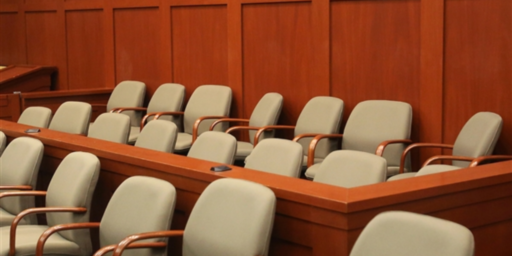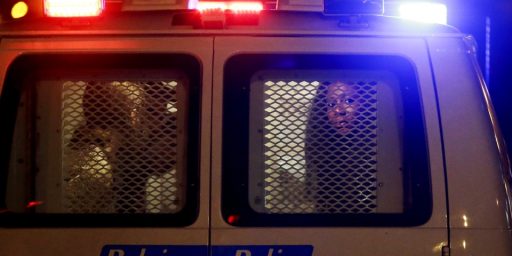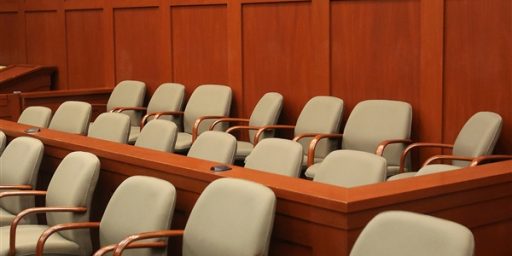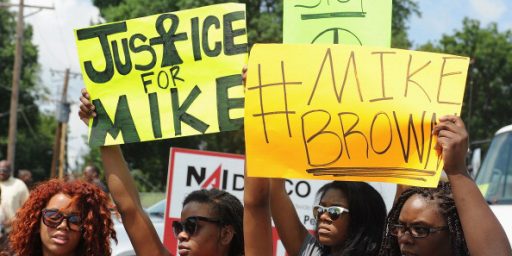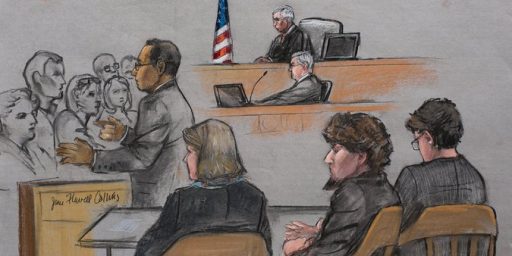Libby Trial: Opening Arguments – Judge’s Instructions
Judge Walton started the proceedings exactly on time (9:30) as seems his wont. The attorneys immediately went up for a sidebar.
The media room is substantially more crowded today than during voir dire. Not surprising, I guess, although a little annoying. Several MSM organizations apparently sent flunkies in to drop off business cards to claim table space early. I’m ignoring said cards.
The sidebar apparently involved a dispute over an outstanding jury instruction about the “materiality” element of perjury, with the defense wanting to say the alleged misstatements occurred during investigation of “allegations” vice “crimes.” The judge agreed to say “alleged crimes.” The defense has a legitimate argument here in that there were no charges stemming from the alleged crimes that the grand jury was empaneled to investigate.
The jury has entered the room and the festivities are about to commence. I’ll do the live blog below the fold. If there is some major breaking news, I’ll post that separately as well to call especial attention to it.
[UPDATE: I’ve decided to truncate after the judge’s instructions and do separate live blogs for the government and defense opening arguments.]
Judge Walton is giving preliminary jury instructions, with more detailed ones to come at the end of the presentation of evidence. This will be followed by opening statements. Key points:
- Opening statements not evidence, merely an outline of the case.
- Defense has prerogative, but not burden, to present opening statement.
- Government’s case-in-chief follows opening statement(s), through witnesses and exhibits.
- Defense has right to present evidence, but has no burden to do so.
- Government has right but not requirement to present rebuttal evidence.
- Then government and defense provide closing arguments, with government then putting on rebuttal.
- An indictment is not evidence and may not be considered such.
- Any orders he gives as to the interpretation of law are THE LAW and none may be ignored by the jury.
- Duty to engage in fair consideration of evidence and only evidence. Sympathy, race, and other issues must be ignored, including any inferences as to the judge’s view of guilt or innocence.
- Objections by attorneys are part of the process. Judge’s ruling is absolute. If he sustains the objection, any testimony heard must be disregarded in deliberations. If objection is overruled, the evidence must be considered.
- ONLY evidence heard IN COURTROOM may be considered. Must totally avoid any outside information during course of trial.
- Presumption of innocence unless and until government proves guilt beyond reasonable doubt. That burden never shifts to the defendant. This is true element-by-element and offense-by-offense.
- Valerie Plame’s status or the potential risk she was placed in is irrelevant.
- A detailed listing of the charges, a reading of the relevant section of the federal code, and a listing of the elements and what is required to prove each of them. Very clearly outlined.
- Material facts in perjury are those which have “natural tendency to influence the exercise of the grand jury’s decisionmaking process.” It must relate to “important fact” with “capacity to influence or effect” the grand jury. “Not necessary for government to prove that the grand jury was in fact misled.”
- A rather amusing discussion about jurors’ duty to not fall asleep and how hard it is to be a judge and truly pay attention. Jurors have a right to raise their hand at any point to signal to the judge that they need a break and he will order a recess immediately.
- Unlike many judges, he allows jurors to take notes. Don’t try to take down verbatim transcript, though, but just occasional things you need to remember. It’s more important to pay attention to the witnesses’ demeanor and such than to take good notes. The notes will be destroyed at the end of deliberations.
- He allows jurors to pose questions by submitting them in writing to the judge.
- The four alternate jurors do not know they are alternates. As AP’s Matt Apuzzo notes, though, everybody who reads the papers knows.
Court in recess for ten minutes.

